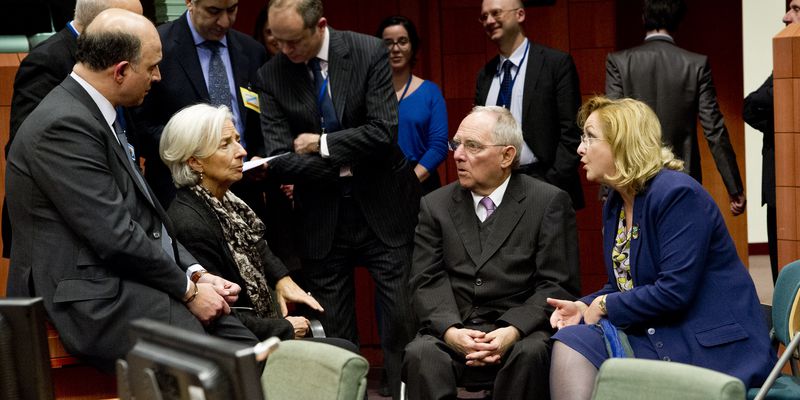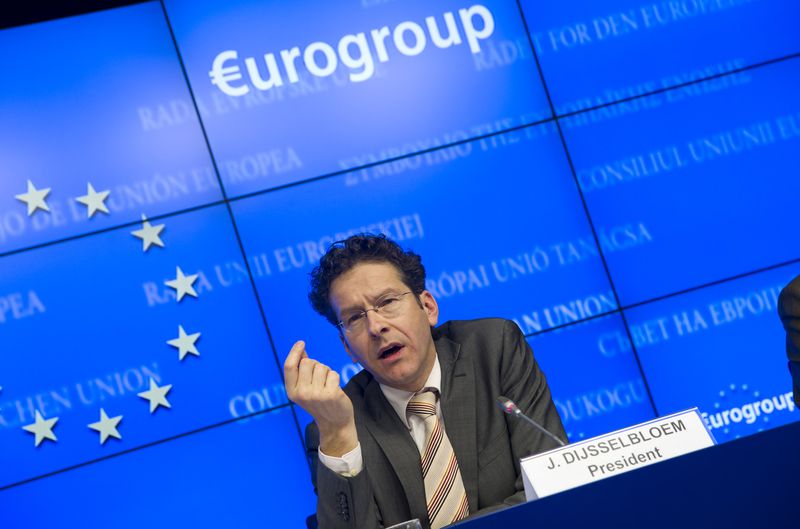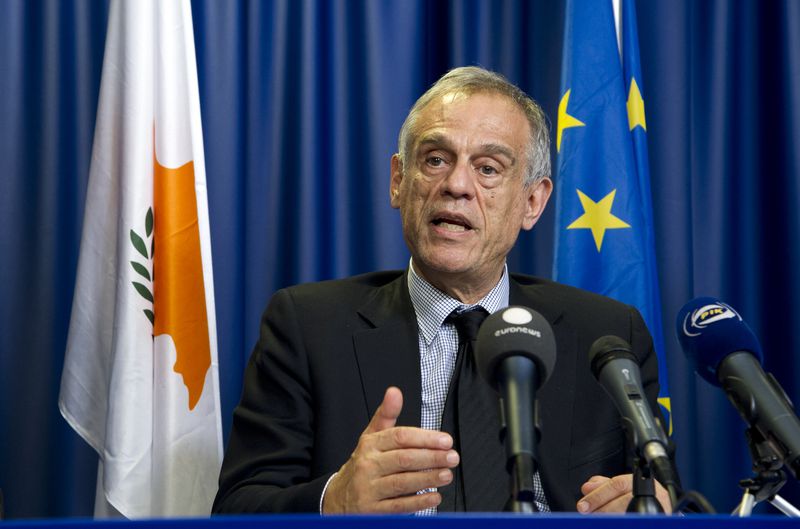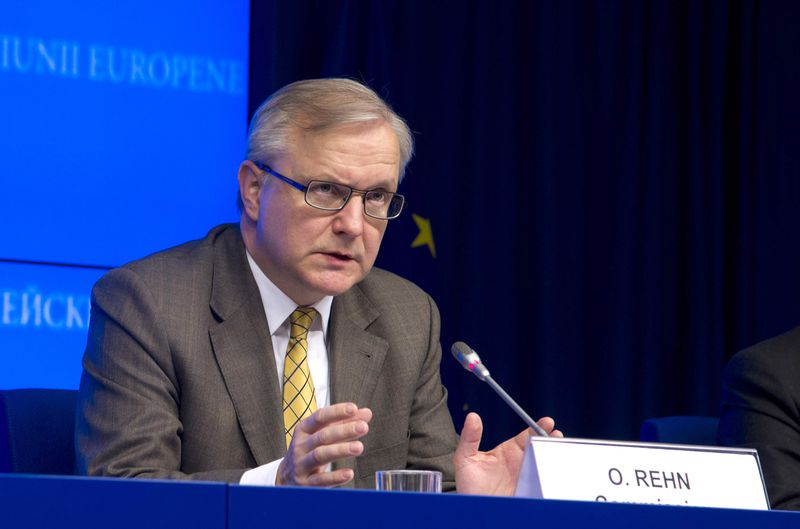Cyprus Remains in EU's Orbit
Adelina Marini, March 28, 2013
 When the German finance minister, Wolfgang Schäuble, said that Cyprus was not of systemic importance for the eurozone which was why there was no need to hurry bailing the Mediterranean island out, he probably had in mind only that if the country defaulted or left the eurozone that would have not shaken the zone of the common currency. However, the scale of the consequences affect the entire EU, its common foreign policy and significantly undermines its efforts for enlargement. No matter right or wrong, the decision on Cyprus will resonate not only in the Union itself, but in Turkey, Russia and even Israel.
When the German finance minister, Wolfgang Schäuble, said that Cyprus was not of systemic importance for the eurozone which was why there was no need to hurry bailing the Mediterranean island out, he probably had in mind only that if the country defaulted or left the eurozone that would have not shaken the zone of the common currency. However, the scale of the consequences affect the entire EU, its common foreign policy and significantly undermines its efforts for enlargement. No matter right or wrong, the decision on Cyprus will resonate not only in the Union itself, but in Turkey, Russia and even Israel.
Cyprus as part of the eurozone
The problems in the offshore zone have been known for a long time and the European Commission signalled as early as two years ago that the zone needed external assistance to handle its financial sector that had bubbled up to 8 times the size of the economy. The then president, however, communist Demetris Christofias, assured that everything was under control. He preferred Russia to the EU for a loan explaining without a shade of shame that he made that choice for purely pragmatical reasons - Russia does not require the government to do anything except only to pay the money back. When Cyprus took over the Council rotating presidency in the second half of 2012, President Christofias explained in the European Parliament that the free market was one thing, while impunity was a totally different thing. The state's retreat from oversight is something bad, he said back then.
A year later, Cyprus already has a new president, centre right Nicos Anastasiades, and an indisputable need for rescue. But if it seems to you that because this is another country that needs bailing out and the track is well beaten making the procedure rather fast, you are deluding yourselves. The main problem in Cyprus is precisely its business model - to shelter under favourable conditions foreign capital with unclear origin. A large share of the capital is owned by Russian oligarchs. That is why the EU, under strong pressure from Germany, insisted Cyprus to ensure first that an overall audit will be made of the financial system, that legislation will be introduced against money laundering and only then the negotiations on the conditions of a rescue programme could begin. The main purpose was to avoid a situation where with the money of European taxpayers will be rescued Russian money with unclear origin, moreover without solving Cyprus's systemic problem - its main source of existence.
When all the prerequisites were at hand, the Eurogroup gathered to prepare the conditions for the loan. Aiming to avoid regular citizens pay for the mistakes of banks and their shareholders, a demand was put forward part of the required amount of money to be collected via a one-off levy on deposits. This caused indignation world-wide and created a danger for a bank run from the Cypriot banking system, which forced the government to announce a continuous banking holiday to keep banks closed. The plan drafted by the Eurogroup was rejected by the parliament of Cyprus and a week later the eurozone ministers of finance met again to agree a new plan.
This time it proved to be much more targeted and envisages in exchange for the 10 billion euros that will be paid by the eurozone permanent rescue fund - the European Stability Mechanism - as well as of the IMF contribution the size of which is still unclear, Cyprus to ensure a contribution of its own. First, the country is required to restructure the second largest of its banks, Laiki, by dividing it into two parts - a "good" and a "bad". The restructuring of the bank has to happen with the contribution of all shareholders, bond holders and equity holders. The "good" part of the bank, meaning all healthy deposits and credits, will be transferred to the Bank of Cyprus which will also take over the nine billion euros sent as an Emergency Lending Assistance (ELA) by the European Central Bank.
The Bank of Cyprus will be recapitalised by levying one time off all uninsured deposits. The size of the levy is still unclear, but it is enshrined in the agreement that the Bank of Cyprus has to reach 9% of capital adequacy by the end of the programme. All insured depositors in all banks will be fully protected in accordance with the respective European legislation, the Eurogroup decision reads. It also says that not even a cent of the ten billion euros European assistance will be spent for recapitalisation of neither of the two biggest and troublesome banks. According to data by Reuters news agency, the problematic banks hold 68 billion euros in the form of deposits, including 38 billion in accounts above 100 000 euros. According to the news agency, those are large sums for an island of 1.1 million population who cannot sustain a financial system of such a size on their own.
As French Finance Minister Pierre Moscovici said, Cyprus is a casino economy, which is on the brink of bankruptcy. In the World Bank blog, Asli Demirguc Kunt, director of Research in the World Bank, points out that Cyprus is a classical example of "moral hazard" when shelter is ensured for the negative consequences of investors' risky behaviour. This increases their appetite for more risk which leads to even greater instability. The capability of Cypriot banks to attract enormous deposits in spite of the continuous excessive exposures to Greek firms, banks, and the government known for its effectiveness, is an example of such a behaviour. In this sense, the World Bank expert writes, the requirement those uninsured depositors to absorb part of the losses is a good practise to limit the moral hazard in the future and to prevent future crises.
The second aspect of the bailout is the adjustment programme. By mid-April the specific parameters of the rescue programme have to be developed by the troika - the representatives of the ECB, the Commission and the IMF. The programme's main purpose will be to solve the issue of financial imbalances. By 2018 the financial sector must be downsized to the EU average, separately from the obligatory fiscal consolidation, structural reforms and privatisation. The economic perspectives ahead of Cyprus are not very encouraging. The economic activity of Cyprus has shrank by 2.3%  in 2012. The biggest drop is registered in the construction and industrial sector. The European Commission registers a weakened activity in the financial sector, too.
in 2012. The biggest drop is registered in the construction and industrial sector. The European Commission registers a weakened activity in the financial sector, too.
In its winter forecast, the Commission expects an economic recession both in 2013 and 2014 mainly due to a drop of domestic demand and investment activity. The labour market conditions have also deteriorated considerably last year when unemployment reached the record high 12.1%. Employment is expected to continue to drop as this year the Commission foresees the number of unemployed to be 13.7% and next year - 14.2 per cent. Public debt has also bubbled dangerously as the ratio to the gross domestic product has reached 86.5% in 2012.
When the Commission presented the winter forecast in February, it stated that the conclusion of an adjustment programme would be essential for the stabilisation of the Cypriot economy. Nonetheless, the country is facing some serious risks related both to the external environment and the domestic front. The biggest risk for Cyprus will continue to be the deterioration of economic conditions in Greece, the forecast reads. The long postponement of the decision for bailout for Cyprus, however, has led to hard conclusions and therefore to tough decisions. Early in the morning on Monday, after the Eurogroup meeting that lasted a whole night, EU Economic and Monetary Affairs Commissioner Olli Rehn said that no other options were left than the hard choices. He made the winter forecast of the Commission even colder saying that the depth of the financial crisis meant that the near future for the country and its citizens would be very difficult.
He hoped that the way they handled hard times before will help them do it again. And you know which times I have in mind, Mr Rehn said, implying about the island's occupation by Turkey in 1974. The common message after the meeting was that if the programme were negotiated earlier, the difficult decisions could have been avoided. The Eurogroup chief, Dutch Finance Minister Jeroen Dijsselbloem, explained that the agreement was on the table at the previous stage too, but it was impossible to reach a political agreement. The IMF chief, Christine Lagarde, also said that against the backdrop of the very complex circumstances a better agreement was hardly possible.
The rescue of Cyprus cannot be viewed only as a rescue of another eurozone country that got infected by some imported disease. A large part of the country's problems are set in the very structure of the Cypriot economy to which there were no pretences so far or exigence. Cyprus is the outcome of a series of political decisions where economy played no role at all. The Greek part of the island joined the EU in 2004 together with 9 predominantly ex-communist countries from the so called 'big bang' enlargement wave, which in fact marked the most romantic period of EU's existence - the covering of the tracks of the Iron Curtain and recovery from the injustices left after the end of World War II. Something for which the EU got the Nobel Peace Prize in 2012.
In that period, the global economy was gaining speed and ahead of the EU were clear skies and calm waters. Cyprus, aside from being a part of that romantic period, is also a part of geopolitical decisions. After the failed attempts for unification of the island and the lack of clarity whether and when Turkey will begin accession negotiations, brining in an unresolved and very complex problem in the very heart of the EU - the eurozone - was a time bomb. But who could tell then that the bomb would be economic?
The external aspect of the Cypriot crisis
Cyprus's economic problems are in fact insignificant, as correctly assessed by the German minister of finance. But they caused severe foreign policy headaches to the EU, mainly in terms of may be the toughest EU strategic partner - Russia. After the announcement of the first deal almost two weeks ago, Moscow reacted sharply threatening even with reciprocal measures. But for the second agreement the Kremlin signalled the deal would be supported. Reuters reported on Monday that President Vladimir Putin ordered the government to negotiate a restructuring of the 2.5 billion  euros loan for Cyprus, agreed in 2011. Russia firmly rejected Cyprus's request for milder conditions on the loan or for another loan.
euros loan for Cyprus, agreed in 2011. Russia firmly rejected Cyprus's request for milder conditions on the loan or for another loan.
Prime Minister Dmitry Medvedev, however, played the role of the bad cop saying the EU acted as an elephant in a china shop "stealing what had already been stolen". The problem with Cyprus emerged at a time when the EU-Russia relations are very cool after the return of Putin to the Kremlin last year. And although Cyprus was hesitating in the days before the deal between Moscow and Brussels, in the end of the day the result is that it remains in the EU's orbit. But for now it is not clear at what price Russia preferred to view this as an internal EU problem. During the negotiations of the deal, there were many speculations that the exchange coin will be Cyprus to secure access to the discovered two years ago off shore natural gas deposits. But tiny Nicosia cannot take the decision for their exploitation on its own, given that it has not yet resolved its problems with the northern part of the island, occupied by Turkey. Besides, Israel also has pretences to the deposits in the Eastern Mediterranean.
And if some years ago Russia's ambassador to NATO called Bulgaria a Trojan horse, probably Cyprus, due to the scale of the troubles it could have created in geopolitical terms, could be commensurate only to Judas Iscariot who sold Jesus for 30 silver pieces. Cyprus has already once sold the EU for two billion and a half euros and was on its way to do it again for a miserable amount of money compared to the benefits it has gained since its 2004 membership. The danger Russia to be brought through the back door into the centre of EU economic and foreign policy was discussed especially critically in the European Parliament. On March 14th Diane Dodds, a non attached member and a politician from Northern Ireland, sent a question demanding a written answer from the European Commission about how will the EU ensure that the discovery of natural gas deposits in the Eastern Mediterranean will not turn into a regional dispute.
While the answer is awaited from the Commission, in the European Parliament the issue of Russia's role was very hot during the first hearing of Jeroen Dijsselbloem in the economic committee on Thursday last week. To the question of liberal MEP Wolf Klinz (Germany) what was his opinion about Russia's active role, Mr Dijsselbloem joked saying he could respond in German, but that would be highly risky. Then he explained that there were contacts with Moscow to discuss the options for a restructuring of the 2.5 billion euros loan.
In general, the attitude of the political groups in the European Parliament was retributionalist. The leader of the biggest group - the European People's Party - Joseph Daul and European Parliament Vice President Corien Wortmann-Kool recalled in a special statement that years ago the Cypriot government rejected the assistance offered by the Commission and preferred the Russian loan. And Guy Verhofstadt, the liberal chief, said that Cyprus was not sinless for the way it managed its banking system. He called on the European Commission to immediately come up with legislative proposals for the establishment of a bank resolution mechanism. And in a special article in The New York Times he points out that the crisis in Cyprus shows how necessary it is not to retreat from the plans for a banking union.
But long before that happens, the EU should mend the errors it made in the accession process. Cyprus is hardly the only case given that the EU has failed for years to ensure economic convergence and cohesion between the member states - a problem which has become acuter in the past years. The main reason for the "falling ill" of countries, including outside the euro area, is in the economic structure of weaker nations which have failed to adapt their legislation and control mechanisms to the level of globalisation and interconnectedness in the internal market. The banking union could solve many problems in the future, but it will not prevent them from emerging.
As in the case of Greece, with Cyprus too it has been explicitly underscored that it is a unique and very specific case. Although this may sound ridiculous, in fact it is true. The presumption with the Cypriot crisis is that those who contributed the most for it  should pay too - low tax seekers, those who seek maximum non-transparency for their incomes and those who want no questions to be asked about their origin. And if this is well sold to the ever getting poorer Europeans, we have to recall that in order for Cyprus to turn into an attractive offshore zone, contribution had politicians elected by the Cypriot citizens. Regretfully, the European integration has still not evolved sufficiently to require those politicians to take their share of the responsibility.
should pay too - low tax seekers, those who seek maximum non-transparency for their incomes and those who want no questions to be asked about their origin. And if this is well sold to the ever getting poorer Europeans, we have to recall that in order for Cyprus to turn into an attractive offshore zone, contribution had politicians elected by the Cypriot citizens. Regretfully, the European integration has still not evolved sufficiently to require those politicians to take their share of the responsibility.
It is important the EU not to forget the Cypriot crisis because yet to emerge on the agenda is the effect from it over the completely frozen integration process of Turkey. It is also important, when the new rules for the banking union are considered, to think about all the mines that have not been uncovered and have not exploded yet. The EU has lost enough foreign policy weight because of the eurozone crisis. Cyprus stroke another blow. May be this will be an encouragement finally the European foreign policy to become more common not only in words.
 Klaus Regling | © Council of the EU
Klaus Regling | © Council of the EU Mario Centeno | © Council of the EU
Mario Centeno | © Council of the EU Mario Centeno | © Council of the EU
Mario Centeno | © Council of the EU